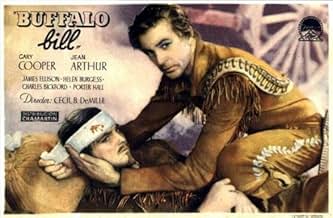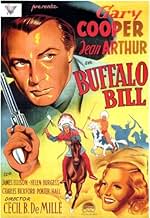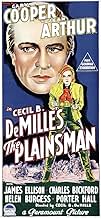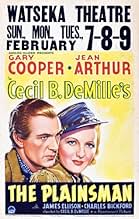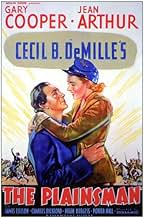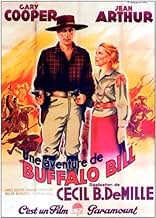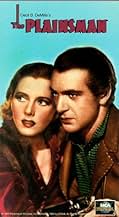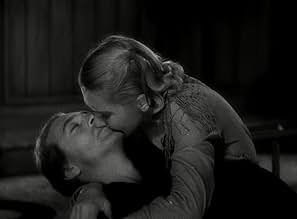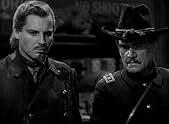VALUTAZIONE IMDb
6,8/10
2554
LA TUA VALUTAZIONE
Aggiungi una trama nella tua linguaWild Bill Hickok and Buffalo Bill Cody attempt to stop an Indian uprising that was started by white gun-runners.Wild Bill Hickok and Buffalo Bill Cody attempt to stop an Indian uprising that was started by white gun-runners.Wild Bill Hickok and Buffalo Bill Cody attempt to stop an Indian uprising that was started by white gun-runners.
- Regia
- Sceneggiatura
- Star
- Premi
- 3 vittorie totali
Fred Kohler
- Jake - A Teamster
- (as Fred Kohler Sr.)
Pat Moriarity
- Sgt. McGinnis
- (as Pat Moriarty)
Recensioni in evidenza
This Cecil B. DeMille movie has all the trademarks of that director. It's a big and spectacular look at the Old West. Perhaps there's a bit too much emphasis on creating an epic and not enough on telling a good story.
To be clear, I don't mind that it takes so many liberties with historical facts. When I watch a movie I don't necessarily need a history lesson, and I can forgive a movie taking liberties in order to tell a good story.
However, there is little subtlety and emotional weight in the storytelling. In the first half, things happen to move the story along, without necessarily making much sense.
Gary Cooper, not my favorite among the western genre's big stars, is aloof as Wild Bill Hickok. No one can deny his cinematic presence, though. Jean Arthur brings some fun to her role as Calamity Jane. I have seen some reviewers praising her performance, but the problem is, she never seems convincing. Lead actresses of this era were expected to be beautiful, romantic and sensitive, and that's fine when they play a beautiful, romantic and sensitive woman, which is most of the time. But Calamity Jane? Can we buy Jane Arthur as dissolute, unconventional and wild? The script gives her more to do in this movie than most actresses get in westerns of this period, but she still has to spend the movie mooning after a disdainful Gary Cooper to provide the conventional romance.
I feel like I'm being more negative than the movie deserves. It's just the it doesn't always live up to its ambition. Once you accept that you can't take the story too seriously, you can enjoy it as harmless entertainment. In fact, it finds more focus in the second half of the movie, which is quite fine.
To be clear, I don't mind that it takes so many liberties with historical facts. When I watch a movie I don't necessarily need a history lesson, and I can forgive a movie taking liberties in order to tell a good story.
However, there is little subtlety and emotional weight in the storytelling. In the first half, things happen to move the story along, without necessarily making much sense.
Gary Cooper, not my favorite among the western genre's big stars, is aloof as Wild Bill Hickok. No one can deny his cinematic presence, though. Jean Arthur brings some fun to her role as Calamity Jane. I have seen some reviewers praising her performance, but the problem is, she never seems convincing. Lead actresses of this era were expected to be beautiful, romantic and sensitive, and that's fine when they play a beautiful, romantic and sensitive woman, which is most of the time. But Calamity Jane? Can we buy Jane Arthur as dissolute, unconventional and wild? The script gives her more to do in this movie than most actresses get in westerns of this period, but she still has to spend the movie mooning after a disdainful Gary Cooper to provide the conventional romance.
I feel like I'm being more negative than the movie deserves. It's just the it doesn't always live up to its ambition. Once you accept that you can't take the story too seriously, you can enjoy it as harmless entertainment. In fact, it finds more focus in the second half of the movie, which is quite fine.
With the end of the North American Civil War, the manufacturers of repeating rifles find a profitable means of making money selling the weapons to the North American Indians, using the front man John Lattimer (Charles Bickford) to sell the rifles to the Cheyenne. While traveling in a stagecoach with Calamity Jane (Jean Arthur) and William "Buffalo Bill" Cody (James Ellison) and his young wife Louisa Cody (Helen Burgess) that want to settle down in Hays City managing a hotel, Wild Bill Hickok (Gary Cooper) finds the guide Breezy (George Hayes) wounded by arrows and telling that the Indians are attacking a fort using repeating rifles. Hickok meets Gen. George A. Custer (John Miljan) that assigns Buffalo Bill to guide a troop with ammunition to help the fort. Meanwhile the Cheyenne kidnap Calamity Jane, forcing Hickok to expose himself to rescue her.
The dated "The Plainsman" is a great deception, with a pretentious and shallow story without historical accuracy, "politically incorrect" in the present days and a terrible screenplay that wastes Gary Cooper and Jean Arthur. Their performances are below average with awful characters. The best part is the beginning, with the inception of the lobby of the greedy manufacturers of weapons using the repeating rifles to provide Indian (and also "white man") annihilation in the name of the pockets full of money. My vote is five.
Title (Brazil): "Jornadas Heróicas" ("Heroic Journeys")
The dated "The Plainsman" is a great deception, with a pretentious and shallow story without historical accuracy, "politically incorrect" in the present days and a terrible screenplay that wastes Gary Cooper and Jean Arthur. Their performances are below average with awful characters. The best part is the beginning, with the inception of the lobby of the greedy manufacturers of weapons using the repeating rifles to provide Indian (and also "white man") annihilation in the name of the pockets full of money. My vote is five.
Title (Brazil): "Jornadas Heróicas" ("Heroic Journeys")
The master of movie spectacle Cecil B. De Mille goes West. Using three legends of the old west as its protagonists (they probably never met),Gary Cooper is portraying Wild Bill Hickock,James Ellison as Buffalo Bill and Jean Arthur does make a nice Calamity Jane. The story serves only for De Mille to hang some marvelous action sequences on, like the big Indian attack.Scenes like that are extremely well done.If you don't mind the somewhat over-the-top performances of the cast this is an very entertaining western.Look out for a very young Anthony Quinn essaying the role of an Indian brave who participated at the battle of Little Big Horn.This part got him at least noticed in Hollywood.
Wild Bill Hickock, Buffalo Bill Cody, and Calamity Jane fight alongside General Custer and expose a scheme by greedy arms manufacturers to sell repeating rifles to renegade Indians.
This somewhat gratuitous exercise in wild west name-dropping is pretty silly but also fairly entertaining as well, though it's a bit too long and runs out of steam near the end.
Also, it might be off-putting to many modern viewers due to it's politically incorrect, stereotyped treatment of Indians.
The feisty Jean Arthur is extremely cute as Calamity Jane and easily runs away with the picture.
Recognizable cameos include iconic western sidekick George "Gabby" Hayes as a wounded scout and director Cecile B. DeMille's future son-in-law Anthony Quinn as the Cheyenne brave who relates the news of Custer's last stand to Cody and Hickock.
This somewhat gratuitous exercise in wild west name-dropping is pretty silly but also fairly entertaining as well, though it's a bit too long and runs out of steam near the end.
Also, it might be off-putting to many modern viewers due to it's politically incorrect, stereotyped treatment of Indians.
The feisty Jean Arthur is extremely cute as Calamity Jane and easily runs away with the picture.
Recognizable cameos include iconic western sidekick George "Gabby" Hayes as a wounded scout and director Cecile B. DeMille's future son-in-law Anthony Quinn as the Cheyenne brave who relates the news of Custer's last stand to Cody and Hickock.
This Cecil B. DeMille epic of the old West contains what may be Jean Arthur's finest performance, as a hysterical, eccentric, incurably amoral, but devotedly doting Calamity Jane. She really pulled it off! Gary Cooper is at his most taciturn, but manages some occasional pithy sayings: 'The plains are big, but trails cross ... sometimes.' The story is a pastiche to end all pastiches. All the cowboy heroes of Western lore seem to be in there somehow except for Jesse James. Even Abraham Lincoln opens the story in person (or at least, DeMille would have us believe so). There is no room for anything so evanescent as subtlety, this is a 'stomp 'em in the face' tale for the masses. A remarkable thing about this film however is that it is a very early full frontal attack on what Eisenhower was eventually to name 'the military industrial complex'. It isn't just a story about gun-runners, but about arming anyone for money, and doing so from the heart of Washington. But let's not get into politics, let's leave that to DeMille, who can be guaranteed to be superficial. The chief interest of this film all these years later is that it uses the first film score composed by George Antheil, who has a lot to say about the job in his autobiography, 'Bad Boy of Music'. Antheil seems to have originated 'the big sound' adopted by all subsequent Westerns, whereby the plains sing out with the voices and sounds of countless cowboys in the sky, celebrating the open spaces and interweaving common melodies. That is why it does not sound at all unusual, because we have heard it a thousand times. But he seems to have been the first to summon up the combined rustlings of all the sage brush into this symphony of the open skies which has entered into American mythic lore, and given it a soundtrack which has never varied since then, corny as it may be, but doubtless appropriate. It is amusing to see Anthony Quinn in an early appearance as a Cheyenne Indian. Gabby Hayes is in there somewhere, but you miss him in the crowd. Gary Cooper overtops them all, looming large, - but when did he ever loom small?
Lo sapevi?
- QuizJohn Wayne very much wanted the role of Wild Bill Hickok, which he felt certain would make him a star, but director Cecil B. DeMille wanted Gary Cooper instead.
- BlooperOn the evening of Lincoln's assassination Van Ellyn and his associates are discussing the supposedly then current John Soule editorial, "Go West, Young Man." Lincoln was murdered in 1865. Soule wrote that famous line in 1851.
- Citazioni
Calamity Jane: Tip your hat when you speak to a lady!
Wild Bill Hickok: I will... when I speak to a lady.
- Versioni alternativeThe UK DVD is cut by 2 secs to remove a horsefall.
- ConnessioniFeatured in The Hollywood Collection: Anthony Quinn an Original (1990)
- Colonne sonoreWhen Johnny Comes Marching Home
(1863) (uncredited)
Written by Louis Lambert
Played as background music for the first scene, Washington, D.C.
I più visti
Accedi per valutare e creare un elenco di titoli salvati per ottenere consigli personalizzati
- How long is The Plainsman?Powered by Alexa
Dettagli
Botteghino
- Budget
- 1.000.000 USD (previsto)
- Tempo di esecuzione1 ora 53 minuti
- Colore
- Proporzioni
- 1.37 : 1
Contribuisci a questa pagina
Suggerisci una modifica o aggiungi i contenuti mancanti


